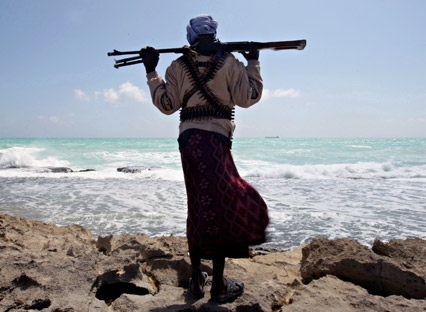Russian navy ‘sent Somalipirates to their death’
Somali pirates reporteddead after being set adriftwithout navigational gear

A free daily email with the biggest news stories of the day – and the best features from TheWeek.com
You are now subscribed
Your newsletter sign-up was successful
Ten captured Somali piracy suspects are thought to have died after the Russian navy released them in an inflatable boat without navigational equipment, Russian media are reporting. An unnamed source told Russia's Interfax news agency yesterday: "It seems that they all died." The alleged pirates seized the container ship Moscow University - carrying $50m of crude oil - on May 5 in the Gulf of Aden. Marines from the Russian warship Marshal Shaposhnikov, which patrols the pirate-infested Gulf as part of an international force, stormed the ship the following day, freeing the unharmed crew. Initially, Russia said the suspected pirates would be taken to Moscow to face trial, but Colonel Alexei Kuznetzov later announced that "imperfections in international law" meant they would instead be released. An international maritime treaty means suspected pirates can be tried in the home countries of their victims – but some governments have been put off this course of action for fear that convicted pirates might not return to Somalia after serving out their time in jail. Kuznetzov seemed to echo this when he said: "Why should we feed some pirates?" Russian media reported that the 10 men were set adrift in a boat with no navigational equipment, and that contact was lost with the boat's radio beacon within an hour. However, Commander John Harbour, a spokesman for the EU naval force in Somalia, told the BBC that the loss of navigation equipment would not necessarily be critical and that the signal from the beacon could vanish if the battery ran out or it entered a satellite blind spot. One Somali news website reported a conversation with an unidentified pirate who claimed the men were indeed dead – but said they had all been shot before they were loaded into the skiff. There is no evidence for this account, and photographs from the Moscow University seem to support Russian reports that marines killed one pirate in a firefight, and took the other ten captive. Commander Harbour observed that the Russian navy was within its rights to release the men as it did – and it is probable that the boat they were returned to was one of their own. He congratulated the Russians on a "brave" and successful action against piracy. The Russian announcement that the men were probably dead led immediately to a tit-for-tat threat from the pirates. Somali media reported one pirate as saying: "In future, if we capture Russians they will meet the same fate as those they executed." If this sabre-rattling translates into deaths it will reflect a recent escalation in violence in the region, as reported previously on The First Post, and could endanger the many hostages taken by the pirates, including British couple Paul and Rachel Chandler, held captive since last autumn. Previously, the pirates have always treated their hostages well. In part, no doubt, this is to ensure ransom payments – but it may also reflect the fact that some do not want to see themselves as pirates and have turned to hostage-taking as a last resort to escape desperate poverty in a violence-riven country with no functioning government. In January, Rachel Chandler told a French journalist: "We have not much time left and are being badly treated." There have been no statements from the couple since then.
A free daily email with the biggest news stories of the day – and the best features from TheWeek.com
The Week
Escape your echo chamber. Get the facts behind the news, plus analysis from multiple perspectives.

Sign up for The Week's Free Newsletters
From our morning news briefing to a weekly Good News Newsletter, get the best of The Week delivered directly to your inbox.
From our morning news briefing to a weekly Good News Newsletter, get the best of The Week delivered directly to your inbox.
-
 How the FCC’s ‘equal time’ rule works
How the FCC’s ‘equal time’ rule worksIn the Spotlight The law is at the heart of the Colbert-CBS conflict
-
 What is the endgame in the DHS shutdown?
What is the endgame in the DHS shutdown?Today’s Big Question Democrats want to rein in ICE’s immigration crackdown
-
 ‘Poor time management isn’t just an inconvenience’
‘Poor time management isn’t just an inconvenience’Instant Opinion Opinion, comment and editorials of the day
-
 How corrupt is the UK?
How corrupt is the UK?The Explainer Decline in standards ‘risks becoming a defining feature of our political culture’ as Britain falls to lowest ever score on global index
-
 White House ends TPS protections for Somalis
White House ends TPS protections for SomalisSpeed Read The Trump administration has given these Somalis until March 17 to leave the US
-
 The high street: Britain’s next political battleground?
The high street: Britain’s next political battleground?In the Spotlight Mass closure of shops and influx of organised crime are fuelling voter anger, and offer an opening for Reform UK
-
 ‘The security implications are harder still to dismiss’
‘The security implications are harder still to dismiss’Instant Opinion Opinion, comment and editorials of the day
-
 Inside Minnesota’s extensive fraud schemes
Inside Minnesota’s extensive fraud schemesThe Explainer The fraud allegedly goes back to the Covid-19 pandemic
-
 Trump targets ‘garbage’ Somalis ahead of ICE raids
Trump targets ‘garbage’ Somalis ahead of ICE raidsSpeed Read The Department of Homeland Security will launch an immigration operation targeting Somali immigrants in the Minneapolis-St. Paul area
-
 Is a Reform-Tory pact becoming more likely?
Is a Reform-Tory pact becoming more likely?Today’s Big Question Nigel Farage’s party is ahead in the polls but still falls well short of a Commons majority, while Conservatives are still losing MPs to Reform
-
 Taking the low road: why the SNP is still standing strong
Taking the low road: why the SNP is still standing strongTalking Point Party is on track for a fifth consecutive victory in May’s Holyrood election, despite controversies and plummeting support